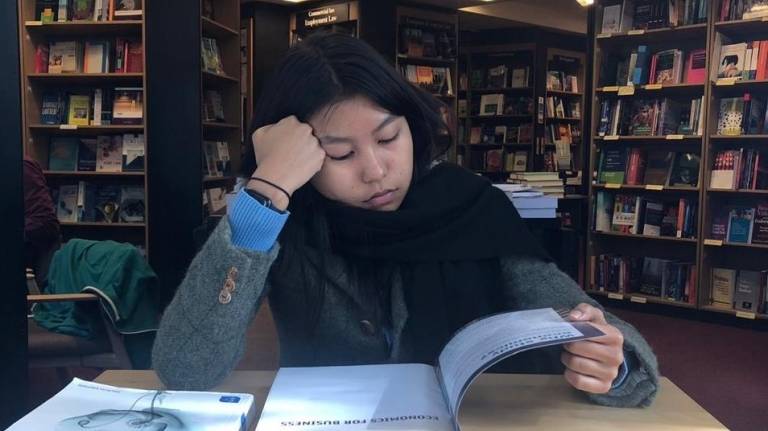Meet Aimi - she graduated from the UPC in 2020 and went on to study Information Management for Business BSc at UCL. Find out more about her time on the UPC, as well as her undergraduate degree.

What’s your background?
I am half-Japanese and half-Kazakh. I grew up in both countries and completed my secondary education at a local school in Kazakhstan before my UPC studies.
Why did you choose to study at UCL?
The Information Management for Business degree offered at UCL captivated me; I had not come across any other UK university offering such a multi-disciplinary course which combines IT, management, and business. This course is ever-changing and adapts to meet environmental demands in the present context, as it is developed collaboratively with global employers.
UCL also serves as a meeting point for the world’s leading researchers and brightest minds from diverse backgrounds, and I wanted to experience studying among such people who contribute major changes to the real world.
What course do you study now and what is it like?
I progressed to my target degree: Information Management for Business BSc. And so far, due to the pandemic, this academic year has been taught online. However, I believe such circumstances have not been as disruptive to this course as I had expected.
Conversely, I realised this course is designed to prepare students in successfully adapting to unforeseen changes in the environment. All of my current modules and related coursework is modified for us to apply course material to the current situation, the limitations experienced in the real world and the potential opportunities.
How has the UPC helped you in your undergraduate degree?
All the essential skills I am using daily for my undergraduate course are those which I developed on the UPC, including critical thinking, academic writing and speaking.
However, the most fundamental skill I acquired is academic research. Finding, assessing, selecting credible and authoritative sources of information and citing them is key when I write weekly essays and assignments. Such skills are not taught at university, although tutors expect you to have them when you start your degree.
What was the biggest challenge you faced during your time on the UPC?
Independent learning and finding information was one of the challenges I experienced. I realised that to get the information I need, I must search for credible sources, hone critical thinking skills and ask for assistance by initiating conversations with tutors to find it.
It was a sharp contrast to school, where teachers helped form my knowledge by guiding through a given textbook. What helped me overcome this was the Academic Research: Approaches & Methods module, which provided the preliminary criteria I should utilise to assess the sources of information I found.
What advice would you give to a prospective UPC student?
Prepare and research UK undergraduate courses before you start the UPC. While there is support from UPC staff and UCAS advisors who will guide you through the application journey, it would be much more beneficial and time-efficient if you identify some UK degree courses that you would like to apply to.
The UCAS applications are completed not so long after you begin the UPC, so having a prepared list of universities can help with managing time for both completing course assignments and university applications.
Another recommendation I would give is to join societies or become a student representative for your module on the UPC. Involvement in activities in addition to your studies gives you a chance to hone time-management skills and experience to differentiate your CV in the future, as well as help you integrate into UCL easier.
What is it like to live and study in London?
As UCL is in the centre of London, I had to get used to the busy working environment. There were always new events, projects or exhibitions to experience across London and this showed me the endless opportunities that this city offers. London is the centre from which global changes and developments start.
I also felt comfortable and accepted by the diverse cultural community in London; people in London were open to talk or make small conversations. In my home countries, I rarely encountered such people, so I was not used to this different mind-set that Londoners had. Interacting with such people, even with cashiers at cafes, helped me hone my communication skills and made me more social and approachable.
What is the most interesting thing you’ve done, seen or got involved with while at UCL?
I participated in a 2-day intensive Enterprise Boot camp organised by UCL. There I gained valuable knowledge about how current businesses work, which helped enrich my understanding of the subject I am currently studying in my undergraduate studies.
Other participants and I were challenged to work in groups and create a disruptive idea to transform the image of global companies which we used as case studies. I enjoyed pitching my idea to other UCL students and implemented my speaking skills which I was practicing at UPC to present in front of 30 other participants.
How is the UK education system different to your home country?
In comparison to my teachers in high school, the UPC tutors were much more approachable and easier to communicate with. Small nuances such as being asked to call them by their first name created a comfortable environment and encouraged me to interact with them and other students.
I was also asked to contribute to discussions and state my opinions to create interesting debates around various topics, which I was not used to as I experienced mostly passive learning at school.
 Close
Close

